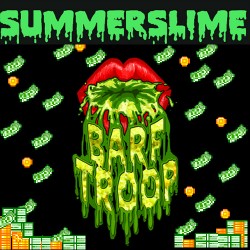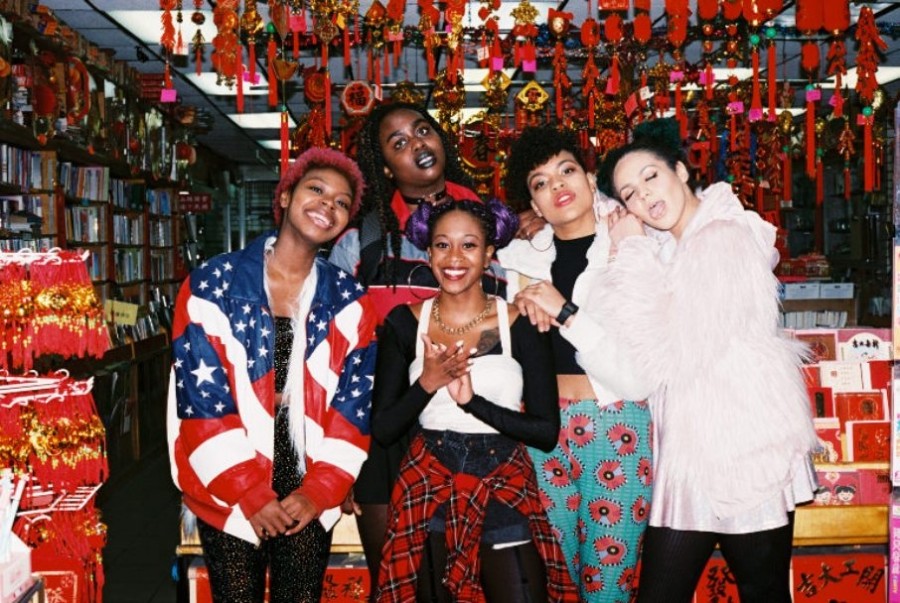With a playful but purposeful demeanor, rap collective Barf Troop makes music that’s just as much about the turn up as it is about self empowerment and self love.
Barf Troop started nearly four years ago when founder and Virginia native Aspen Eray — artist name Babeo Baggins — joked about starting a group that would be “rivals to Odd Future.”
The 22-year-old — “going on 12,” Baggins says, laughing — met her future bandmates on Tumblr. They hailed from places like Atlanta, Chicago and Canada, but after Baggins posted a song based on a video-game character she loved, Barf Troop was born across time zones.
 Like thousands of budding ensembles that find their creative tools on the Internet, Barf Troop’s members record raps on their MacBooks, email audio files back and forth and self-release music on Bandcamp — and already the ensemble has grown a massive following online. The group’s fans seem to appreciate Barf Troop’s scrappy recordings just as much as its message of acceptance and inclusion.
Like thousands of budding ensembles that find their creative tools on the Internet, Barf Troop’s members record raps on their MacBooks, email audio files back and forth and self-release music on Bandcamp — and already the ensemble has grown a massive following online. The group’s fans seem to appreciate Barf Troop’s scrappy recordings just as much as its message of acceptance and inclusion.
Now, Baggins is busy plotting Barf Troop’s come up. She has a mixtape called Posi+ive coming in May. Babelien, the group’s newest member, is working on music production. Babe Simpson, Babe Field, Babenstein and Baberella Fox — Barf Troop includes both nonbinary and cisgender artists, so the group uses “babe” as a gender-neutral term — also plan to release music this year.
Meanwhile, Baggins’ latest song is a cover of Lykke Li’s “Little Bit” that finds her singing, reworking the track and adding a verse that flaunts her quick and precise flow.
Recently I met with Baggins on her turf in Columbia Heights, and we talked about why rap is punker than punk, her plans for her upcoming mixtape and what it’s like to be in a rap collective across borders.
This interview has been edited for clarity and length.
Bandwidth: Why did you all decide to work together in this rap collective?
Babeo Baggins: Well, all of us in Barf Troop are very — I don’t want to say out of the “norm” because normal is very subjective. But we really connected on a lot of things that we didn’t really connect on with anybody else. We’re super-into so many different things, and we see things in a very different light and we all agree on that, which we haven’t really found elsewhere.
Warning: Explicit lyrics.
Tell me about the process of creating music with Barf Troop.
We’re always sending stuff to each other because at the end of the day, we’re a group. Although we’re individuals and we’re going to make individual music, we have to think about the fact that we are a unit and anything that we’re going to put out is going to affect us collectively.
I know I have a lot of people in my life that are inspiring to me and that I respect, but the people in Barf Troop, those are the visionaries in my life, those are the ones that if they hear it and they like it, then I know it’s good.
[About the] recording process, well, before this year, we were recording on my MacBook because that’s how it started, just right off our MacBooks. Before last year, I was mastering everything on my own — which I’m s**t at, so thank God we found somebody to do that. This year, for my tape and for Babe Simpson’s tape, we’ve gotten studio time, which is really cool.
A lot of people hear beats and then write the rap, but we don’t do that. It’s much easier to write a song and figure out a beat to go behind that so it’s natural, versus you trying to make something work just because you think the beat’s real hot. The lyrics are more important than the beat.
When did you start rapping?
I’ve always been musically inclined. I played guitar, bass, piano, ukulele — no drums, sadly — and I’ve always been singing. But rapping is a very new thing to me specifically. I didn’t get into rap music until my late teens because I’m from the country [Southern Virginia], so I was in singing camps for a long time and I was listening to Fall Out Boy and Panic! At the Disco. In my later teens, I started growing out of that and listening to rap.
I love music altogether but rap, specifically, is so freeform. It’s literally the most “punk” music there is, even more so than punk music itself. You can do anything within the rap genre. You have Tupac, Young Thug, Azealia Banks all in the same category because rap is what you want it to be. Rap is what I feel not only represents me as a person of color but as a creative individual.
“Rap is so freeform. It’s literally the most ‘punk’ music there is, even more so than punk music itself. You can do anything within the rap genre.”
How has Barf Troop changed over the years?
It’s changed a lot. When we all started, we were all teenagers. I was definitely in a very different place when this started. This started as a sort of release from a very bad situation I was living in at the time, and it was an escape from that not only creatively, but I could just get away from it for a while.
Now, the music that I’m making is for expression, versus just making a song because I want to think about something else. It’s definitely more of an art now.
What we make has become an art rather than just a hobby. This is what we see as our careers, what we spend our time on, what we talk about 24/7. My music is my main focus and everything else that I do is the part-time now. That’s the biggest change.
What’s the music vibe in D.C.? What’s it like to be an artist here?
I got asked that by a very influential person here in D.C. She asked me how I felt about the D.C. music scene and how I felt about it versus other places. New York and L.A. are definitely heavily populated with musicians, but here in D.C., the musicians feel like a family. Anytime I see my friends perform or go to a show, you feel welcomed and you feel like, “Yeah, we’re a part of this together.”
It’s using what you have to make more for yourself, whereas in New York City or L.A., it’s like dog eat dog. In D.C., it’s like, if I’m eating, you eating, even if we’re not super-close. We’re both musicians and I understand your struggle and you understand mine.
Warning: Explicit lyrics.
What’s coming up next for Barf Troop?
We’re working on a lot of visuals this year — more collective visuals. I have something really cool planned for my mixtape release. I’m also working on starting an art collective here in D.C. It’s going to be focused on women, gay community, trans community, queers [and] nonbinaries, so they can have a place to express in D.C. Hopefully that’ll be done by this summer and I want everyone to be involved.
We have a group track coming up soon. It’s constant work. A constant creative work environment.
Why is it important to have a collective of women and nonbinary people?
The cool thing right now is that we’re in a time where everybody is looking into themselves to figure out how they really feel, and they’re becoming more open and accepting of not only themselves but others. It’s important to have a music outlet for people who are finally finding themselves and need people to look to.
When I was little, it was Spice Girls, they were strong, they weren’t singing like, “Oh my God, why don’t you like me?” That was inspiring to me.
Now, at the time we’re in, the kids that are in the position that I was when I was very young — when I was feeling gender-fluid — people need to see that even if you feel like a boy, it doesn’t mean you have to “look” like a boy. Or if you feel like a girl, you don’t have to “look” like a girl. Or if you identify as male but you think dresses are cool, it’s not a big deal.



Pingback: Article for Bandwidth: Interview with Babeo Baggins of Barf Troop | The Selected Works of Teta Alim()
Pingback: Drake Covers Nico & Jackson Browne’s “These Days”: Listen | Idolator()